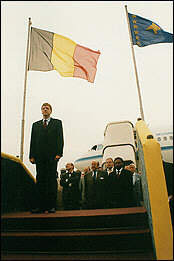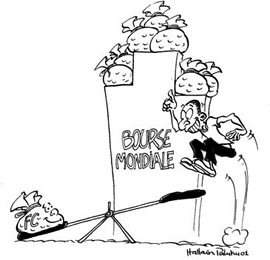 INTERNATIONAL COOPERATION, THE MESSAGE OF HOPE INTERNATIONAL COOPERATION, THE MESSAGE OF HOPE |
Internation cooperation | Dialogue with the World Bank
The disintegration of the Democratic Republic of Congo more or less started after all the multilateral and bilateral donors suspended their cooperation. It was a terrible blow to the country, and very disrupting to a Congolese economy that saw all activities linked to cooperation suddenly coming to a halt.
The sincere political will emanating from the Congolese Head of the State has stirred a new demand to resume cooperation efforts. However, according to Mr. Thierry Jungers, President of the Belgian-Congolese Chamber of Commerce, first it will be necessary to restore peace in Congo.
"Peace is a sine qua non condition before any resumption and consequently important efforts have to be made. The country needs to be united again, not only politically, but also economically and monetarily, since there are several monetary zones with different exchange rates."
The Belgian-Congolese Chamber of Commerce intends to contribute to the cooperation between Belgian and Congolese businessmen, despite the fact that political, economic and social events have pushed most of the Belgian partners to close down shop.

The festiv
ities surrounding the 41st anniversary of the Independence of Congo witnessed the presence of the Belgian Prime Minister, Mr. Guy Verhofstadt, and his Foreign Affairs Minister, Mr. Louis Michel. Their presence was a very clear sign of the end of DRC's international isolation. The Democratic Republic of Congo and its Government count considerably on Belgium to convince the international community of the DRC's case. The success of the reforms that have already been implemented is not enough. There could be a role for Belgium to get sincerely involved in this process. Nobody has forgotten the excellent results of Belgian-Congolese cooperation in the economy of the DRC. 1990 marked he end of this cooperation, and the functioning of Congolese companies was severely affected, GÉCAMINES in the first place.
 DIALOGUE WITH THE WORLD BANK DIALOGUE WITH THE WORLD BANK |
International institutions, such as the World Bank and the IMF, have responded enthusiastically to the changes taking place in Congo by resuming structural cooperation. It has taken more than ten years to see the international community and certain traditional donors, during the recent meeting of the World Bank, to restart talks with the government of Joseph KABILA and to speak again the language of cooperation.
| It is within this context that the government, together with the financial support of the World Bank has started a vast program. The WB has contributed USD 50 million to reinforce the workings of the Democratic Republic of Congo's Institutions to solve the problems that arise in their particular areas. This contribution of the WB will surely contribute to the reactivation of a sector, in which the biggest handicap still is the lack of financial means.

For example, contrary to a successful company like Midema from the Congolese food industry, Utexafrica, illustrates the failure of the Congolese industry in general, and of the textile industry in particular. The group of African Textile Factories - Usines Textiles Africaines- UTEXAFRICA, constituted the most important industrial complex of cotton textiles in the DRC. However, today, after several trials to rebuild itself, it has finally decided to close its factories. It is a fact that when a company as important as Utexafrica sinks, the first responsibility should fall on the Congolese State for not been able to protect the local textile manufacturing. The Utexafrica case illustrates the failure of the whole local textile industry. In fact almost all the textile companies of the country have closed down or live under such a paralyzing situation that they will irremediably fail. However, it should be pointed out that the Government has attempted several times to protect the local industry from the invasion of imported textile goods, allegedly considerably cheaper and closer to the purchasing power of the population. A clear example of this are the measures implemented by the Government of Laurent Désiré KABILA, father of the current president, prohibiting imports of Chinese cloth. These measures adopted more than 12 months ago were never implemented.
Nevertheless certain industries, in particular the beer, food and tobacco industries do persist despite of the crises, and some of them show a remarkable financial health.
Mr. Alain Huart, President and General Director of Midema, points to the causes and effects of this phenomenon when he notes that "For ten years the country has experienced difficult periods. For instance, the infamous 1991 and 1993 plunders had an important and immediately damaging effect on industrial production. The economic consequences caused by this war in the country, and in the Kinshasa region in particular, were very important, in particular because the politicians' energy was almost exclusively concentrated on problems related to the war. Consequently the management of the economy was very erratic. A series of unfortunate decisions were taken that strongly penalized the national industry and created a strong dependency on imported food for the country. According to the Federation of Congolese Companies (FEC) the industry works today at 15-20% of its capacity." |

